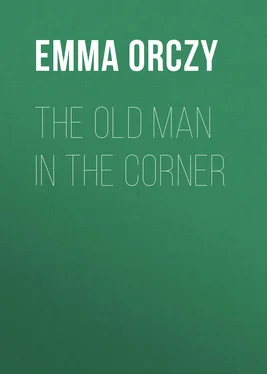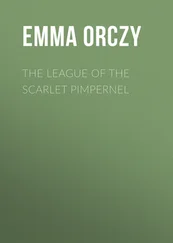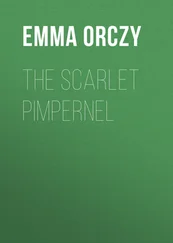Emma Orczy - The Old Man in the Corner
Здесь есть возможность читать онлайн «Emma Orczy - The Old Man in the Corner» — ознакомительный отрывок электронной книги совершенно бесплатно, а после прочтения отрывка купить полную версию. В некоторых случаях можно слушать аудио, скачать через торрент в формате fb2 и присутствует краткое содержание. Жанр: foreign_prose, Классический детектив, foreign_detective, foreign_antique, на английском языке. Описание произведения, (предисловие) а так же отзывы посетителей доступны на портале библиотеки ЛибКат.
- Название:The Old Man in the Corner
- Автор:
- Жанр:
- Год:неизвестен
- ISBN:нет данных
- Рейтинг книги:5 / 5. Голосов: 1
-
Избранное:Добавить в избранное
- Отзывы:
-
Ваша оценка:
- 100
- 1
- 2
- 3
- 4
- 5
The Old Man in the Corner: краткое содержание, описание и аннотация
Предлагаем к чтению аннотацию, описание, краткое содержание или предисловие (зависит от того, что написал сам автор книги «The Old Man in the Corner»). Если вы не нашли необходимую информацию о книге — напишите в комментариях, мы постараемся отыскать её.
The Old Man in the Corner — читать онлайн ознакомительный отрывок
Ниже представлен текст книги, разбитый по страницам. Система сохранения места последней прочитанной страницы, позволяет с удобством читать онлайн бесплатно книгу «The Old Man in the Corner», без необходимости каждый раз заново искать на чём Вы остановились. Поставьте закладку, и сможете в любой момент перейти на страницу, на которой закончили чтение.
Интервал:
Закладка:
"'The affair is as mysterious to me as to your Honour, and to the police of this country.'
"Francis Smethurst was discharged, of course; there was no semblance of evidence against him sufficient to commit him for trial. The two overwhelming points of his defence which had completely routed the prosecution were, firstly, the proof that he had never written the letters making the assignation, and secondly, the fact that the man supposed to have been murdered on the 10th was seen to be alive and well on the 16th. But then, who in the world was the mysterious individual who had apprised Kershaw of the movements of Smethurst, the millionaire?"
CHAPTER III
HIS DEDUCTION
The man in the corner cocked his funny thin head on one side and looked at Polly; then he took up his beloved bit of string and deliberately untied every knot he had made in it. When it was quite smooth he laid it out upon the table.
"I will take you, if you like, point by point along the line of reasoning which I followed myself, and which will inevitably lead you, as it led me, to the only possible solution of the mystery.
"First take this point," he said with nervous restlessness, once more taking up his bit of string, and forming with each point raised a series of knots which would have shamed a navigating instructor, "obviously it was impossible for Kershaw not to have been acquainted with Smethurst, since he was fully apprised of the latter's arrival in England by two letters. Now it was clear to me from the first that no one could have written those two letters except Smethurst. You will argue that those letters were proved not to have been written by the man in the dock. Exactly. Remember, Kershaw was a careless man—he had lost both envelopes. To him they were insignificant. Now it was never disproved that those letters were written by Smethurst."
"But—" suggested Polly.
"Wait a minute," he interrupted, while knot number two appeared upon the scene, "it was proved that six days after the murder, William Kershaw was alive, and visited the Torriani Hotel, where already he was known, and where he conveniently left a pocket-book behind, so that there should be no mistake as to his identity; but it was never questioned where Mr. Francis Smethurst, the millionaire, happened to spend that very same afternoon."
"Surely, you don't mean?" gasped the girl.
"One moment, please," he added triumphantly. "How did it come about that the landlord of the Torriani Hotel was brought into court at all? How did Sir Arthur Inglewood, or rather his client, know that William Kershaw had on those two memorable occasions visited the hotel, and that its landlord could bring such convincing evidence forward that would for ever exonerate the millionaire from the imputation of murder?"
"Surely," I argued, "the usual means, the police—"
"The police had kept the whole affair very dark until the arrest at the Hotel Cecil. They did not put into the papers the usual: 'If anyone happens to know of the whereabouts, etc. etc'. Had the landlord of that hotel heard of the disappearance of Kershaw through the usual channels, he would have put himself in communication with the police. Sir Arthur Inglewood produced him. How did Sir Arthur Inglewood come on his track?"
"Surely, you don't mean?"
"Point number four," he resumed imperturbably, "Mrs. Kershaw was never requested to produce a specimen of her husband's handwriting. Why? Because the police, clever as you say they are, never started on the right tack. They believed William Kershaw to have been murdered; they looked for William Kershaw.
"On December the 31st, what was presumed to be the body of William Kershaw was found by two lightermen: I have shown you a photograph of the place where it was found. Dark and deserted it is in all conscience, is it not? Just the place where a bully and a coward would decoy an unsuspecting stranger, murder him first, then rob him of his valuables, his papers, his very identity, and leave him there to rot. The body was found in a disused barge which had been moored some time against the wall, at the foot of these steps. It was in the last stages of decomposition, and, of course, could not be identified; but the police would have it that it was the body of William Kershaw.
"It never entered their heads that it was the body of Francis Smethurst, and that William Kershaw was his murderer .
"Ah! it was cleverly, artistically conceived! Kershaw is a genius. Think of it all! His disguise! Kershaw had a shaggy beard, hair, and moustache. He shaved up to his very eyebrows! No wonder that even his wife did not recognize him across the court; and remember she never saw much of his face while he stood in the dock. Kershaw was shabby, slouchy, he stooped. Smethurst, the millionaire, might have served in the Prussian army.
"Then that lovely trait about going to revisit the Torriani Hotel. Just a few days' grace, in order to purchase moustache and beard and wig, exactly similar to what he had himself shaved off. Making up to look like himself! Splendid! Then leaving the pocket-book behind! He! he! he! Kershaw was not murdered! Of course not. He called at the Torriani Hotel six days after the murder, whilst Mr. Smethurst, the millionaire, hobnobbed in the park with duchesses! Hang such a man! Fie!"
He fumbled for his hat. With nervous, trembling fingers he held it deferentially in his hand whilst he rose from the table. Polly watched him as he strode up to the desk, and paid twopence for his glass of milk and his bun. Soon he disappeared through the shop, whilst she still found herself hopelessly bewildered, with a number of snap-shot photographs before her, still staring at a long piece of string, smothered from end to end in a series of knots, as bewildering, as irritating, as puzzling as the man who had lately sat in the corner.
CHAPTER IV
THE ROBBERY IN PHILLIMORE TERRACE
Whether Miss Polly Burton really did expect to see the man in the corner that Saturday afternoon, 'twere difficult to say; certain it is that when she found her way to the table close by the window and realized that he was not there, she felt conscious of an overwhelming sense of disappointment. And yet during the whole of the week she had, with more pride than wisdom, avoided this particular A.B.C. shop.
"I thought you would not keep away very long," said a quiet voice close to her ear.
She nearly lost her balance—where in the world had he come from? She certainly had not heard the slightest sound, and yet there he sat, in the corner, like a veritable Jack-in-the-box, his mild blue eyes staring apologetically at her, his nervous fingers toying with the inevitable bit of string.
The waitress brought him his glass of milk and a cheese-cake. He ate it in silence, while his piece of string lay idly beside him on the table. When he had finished he fumbled in his capacious pockets, and drew out the inevitable pocket-book.
Placing a small photograph before the girl, he said quietly:
"That is the back of the houses in Phillimore Terrace, which overlook Adam and Eve Mews."
She looked at the photograph, then at him, with a kindly look of indulgent expectancy.
"You will notice that the row of back gardens have each an exit into the mews. These mews are built in the shape of a capital F. The photograph is taken looking straight down the short horizontal line, which ends, as you see, in a cul-de-sac . The bottom of the vertical line turns into Phillimore Terrace, and the end of the upper long horizontal line into High Street, Kensington. Now, on that particular night, or rather early morning, of January 15th, Constable D 21, having turned into the mews from Phillimore Terrace, stood for a moment at the angle formed by the long vertical artery of the mews and the short horizontal one which, as I observed before, looks on to the back gardens of the Terrace houses, and ends in a cul-de-sac .
Читать дальшеИнтервал:
Закладка:
Похожие книги на «The Old Man in the Corner»
Представляем Вашему вниманию похожие книги на «The Old Man in the Corner» списком для выбора. Мы отобрали схожую по названию и смыслу литературу в надежде предоставить читателям больше вариантов отыскать новые, интересные, ещё непрочитанные произведения.
Обсуждение, отзывы о книге «The Old Man in the Corner» и просто собственные мнения читателей. Оставьте ваши комментарии, напишите, что Вы думаете о произведении, его смысле или главных героях. Укажите что конкретно понравилось, а что нет, и почему Вы так считаете.












